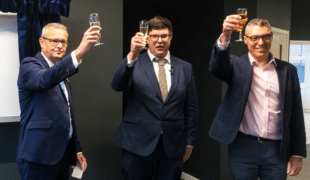Sustainability in the workplace is an important component in the whirling machine of Isosceles.
From the demolition and construction of our headquarters in Egham in December 2017, when most of the existing building was recycled, to encouraging our people to consider the ongoing environmental concerns in our offices, we recognise that our day-to-day decisions have much broader implications.
In our latest discussion, we chat with our CEO, Mike O’Connell, about the company’s impact on the environment.
Demolition and recycling of The Old Police Station
Sustainability in the workplace began with Isosceles in December 2017, when we demolished The Old Police Station, which had stood at the High Street site in Egham since its construction in 1937.
From the demolition, we were able to recycle the most common construction and demolition materials, including:
- Concrete
- Porcelain
- Rigid plastics
- Tiles
- Timber
- Metals
- Glass
- Masonry
- Plastic
- Rock
- Carpet
Almost all of The Old Police Station was recycled, and all the non-recycled products from the demolition fitted into just two containers.
Mike says: “The crushed concrete, bricks, metal, and wood from the demolished building were used on other local building sites to support infrastructure projects, including roads and pavements.”
Mike also outlines how the use of recycled materials within the local community minimised the impact of construction on the environment: “We were able to reduce transportation costs, landfill space and the demand to manufacture new materials.”
Construction of the new state-of-the-art office with sustainability in the workplace in mind
Using modern building materials and construction techniques, we designed and constructed the new office with highly efficient insulation in the floor, walls, and roof.
It would have been reasonable to settle at this point, but we even went further; fitting an energy-efficient heating, cooling and ventilation system which met the requirements at the time of the government Enhanced Capital Allowance (ECA) scheme enabled us to offset the cost of the system against our profits.
We also fitted low energy lighting (and PIR sensor lighting in areas with less use), taps to dispense cold and sparkling water as an alternative to bottled water, water-saving toilets, and taps. In our day-to-day operations, we recycle where possible. It’s these small changes which, when combined over time, add up over the lifetime of our office.
Several other sustainability efforts have been made to reduce our impact on the environment, including:
- We replaced the tarmac car park of The Old Police Station with gravel and permeable paving to allow better drainage during heavy rainfall.
- Our energy-efficient windows are designed to reduce heat loss and CO2 emissions. Made of 93% recyclable components, the blinds allowing us to control the sunlight.
- In a deliberate and concerted effort to go green, we also planted more trees, hedging and plants to improve the environment and air quality for those using the building and residents looking at the building.
Overall, our efforts have substantially reduced our carbon emissions; our energy bills are now just 25% of what they once were in the building.
Celebrating this impressive reduction, Mike says: “This is an impressive feat which demonstrates the power of our alterations and the impact such changes have had on our energy consumption.”
Sustainability in the Workplace Post-completion Facts and figures
Post-completion, and because of our efforts to improve the building’s efficiency, we observed several impressive reductions from the second quarter of 2018, including an average energy cost reduction of 75%.
“From a business perspective,” Mike adds. “These statistics speak for themselves and indicate the true power of operating in an environmentally friendly way.”
Similarly, from an environmental perspective, Mike refers to the changes as having had a “reassuring and galvanising effect” on the team to go even further.
Changing working practices
Mike explains how upon completion of our new office, we actively encouraged people to consider the Cycle to Work Scheme: “To reduce the barriers, we constructed cycle storage facilities and a shower to make it easier for people to cycle to work instead of driving or taking public transport.”
All our desks have an additional screen connected to enable people to use two screens as they work, which has helped reduce the amount of printing that must be done; we now use 20% of the paper we used previously.
“There was a range of modern building techniques and technologies incorporated into the construction of our new office,” Mike explains. “By ensuring such changes were implemented, we were able to modify and reduce the resources we use and thereby contribute in a small but meaningful way to improve the environment.”
Food for thought: Lessons from the UN’s Intergovernmental Panel on Climate Change (IPCC)
Changes in activity are altering the climate in concerning ways, a landmark UN scientific report has warned.
The study, which comes ahead of the critical climate summit known as COP26, has been published by the UN’s IPCC and warns of extreme heatwaves, droughts and flooding, and the breach of a key temperature limit in just over a decade.
Isosceles Director Caroline Frew adds: “The sobering review conducted by the UN’s IPCC only serves to highlight the need to make sustainable changes.”
“Recent events such as the commercial spaceflights launched by Sir Richard Branson and Jeff Bezos, major review conducted by the UN’s IPCC and upcoming COP26 climate summit have given us a stark reminder of our fragile planet.”
“We are all responsible for ensuring the natural resources we use do not compromise the ability of future generations to support themselves.”
Caroline concludes: “Whilst the challenge to protect our planet is sometimes perceived as an insurmountable task, millions of diverse small actions can have a ripple effect.”
Related article: Isosceles’ new state-of-the-art HQ
Join us on Twitter and LinkedIn



